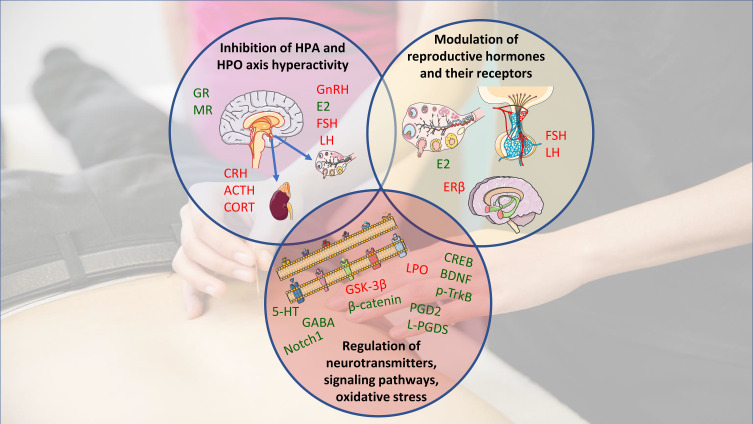Figure 1.
Potential mechanisms by which acupuncture may improve perimenopausal depression and insomnia. Manual- and/or electro-acupuncture may alter hypothalamic-pituitary-adrenal and -ovarian hyperactivity; modulate reproductive hormones and their receptors, or regulate neurotransmitters, signaling pathways, and oxidative stress. Green indicates an upregulation/increase by acupuncture (↑); red indicates a downregulation/decrease (↓). Acupuncture may also improve perimenopausal depression and insomnia by improving vasomotor symptoms, while this indirect effect is not shown. Images are adapted from Servier Medical Art under Creative Commons CC-BY license.
Abbreviations: HPA, hypothalamic-pituitary-adrenal; HPO, hypothalamic-pituitary-ovary; GR, glucocorticoid receptor; MR, mineralocorticoid receptor; GnRH, gonadotropin-releasing hormone; E2, estradiol; FSH, follicle-stimulating hormone; LH, luteinizing hormone; CRH, corticotropin-releasing hormone; ACTH, adrenocorticotropic hormone; CORT, cortisol; ERβ, estrogen receptor beta; 5-HT, 5-hydroxytryptamine; GABA, gamma-amino butyric acid; CREB, cAMP-response element-binding protein; BDNF, brain-derived neurotrophic factor; p-TrkB, phosphorylated-TrkB; PGD-2, prostaglandin D2; L-PGDS, lipocalin-type prostaglandin D synthase; LPO, lipid peroxidation; GSK-3β, glycogen synthase kinase-3 beta.

